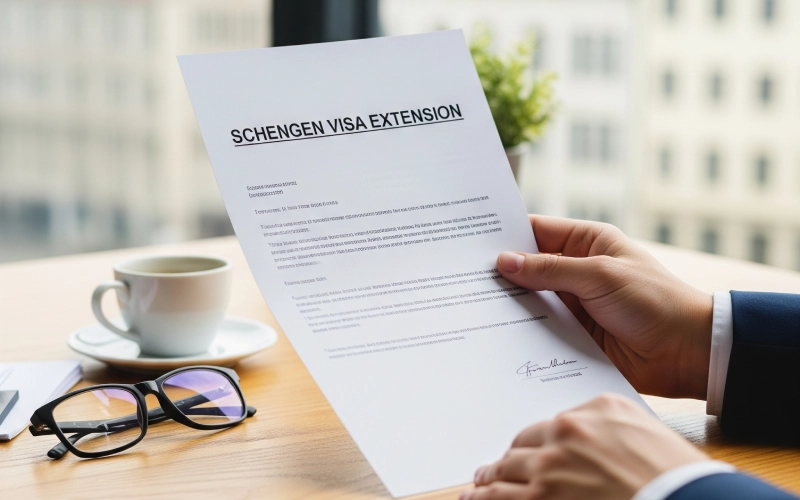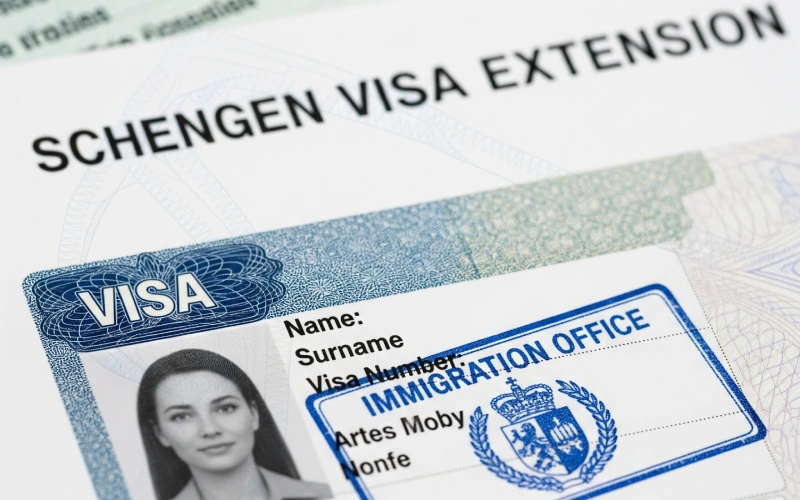There is never enough time to be in Europe. But once your Schengen visa validity runs out, you’re required to leave the Schengen Zone. This raises a common question: can you extend a Schengen visa? While the application process is usually rigid, there are certain exceptions where an extension is possible. Let’s take a closer look at the situations that allow for Schengen visa extension and how you can apply for one.
What Is a Schengen Visa Extension?
A Schengen Visa Extension lets you stay in the Schengen area beyond the original validity of your visa. Normally, a Schengen visa allows up to 90 days within a 180-day period. However, if unexpected circumstances arise, such as delayed flights or medical situations, you may request more time.
➣ Who Can Apply for a Schengen Visa Extension?
Is everyone eligible for a Schengen visa extension? Not really. Here are the conditions that you must fulfill to extend your visa:
- You are already inside the Schengen Zone.
- Your current visa is valid.
- You can provide strong reasons and documents supporting your request.
Exploring Europe is exciting, but you can’t just extend a visa because you want a longer vacation. Extensions are granted for reasons such as medical emergencies, family issues, weather turbulences, or flight disruptions.

➣ Difference Between Renewal and Extension
In situations like these, when you can’t leave the Schengen area, you might be confused about whether to go for a visa renewal or extension. Here’s the catch:
- Visa renewal means applying for a new visa, often from outside the Schengen area.
- Visa extension means extending the duration of your current short-stay visa while you’re already in the Schengen Zone.
Schengen Visa Extension Rules & Eligibility
Now that you’re familiar with the visa extension process, here are the basic guidelines to clarify the steps.
- You must not exceed the 90/180-day rule, which means not staying over 90 days in 180 days of duration.
- Your passport should be valid for at least 3 months beyond your new departure date.
- You need proof of funds (at least €55 per person per day).
- You must have travel insurance covering the extended period.
- You are not a risk to national security.
➣ Countries with Flexible Extension Policies
Some countries, such as the Netherlands, Belgium, and Luxembourg, allow limited territorial extensions in special cases. Surinamese nationals over 60, for example, can extend their stay beyond 90 days once per visit.
➣ Cases Where Extension Is Not Allowed
You can’t extend your visa if:
- You’ve already overstayed the valid duration.
- An alternative travel option exists; for example, when one of the flights gets cancelled, you can still take another flight home.
- You’re trying to live or work illegally, and authorities have information about it.
Valid Reasons for Extending a Schengen Visa
Above all the rules and regulations, comes the most important factor: the reason behind your Schengen visa extension.

Humanitarian Reasons: For travelers who have situations like a death in the family or an urgent family concern, they may qualify for the extension. It should be a personal pressing matter, like a serious health problem, illness, or medical treatment concerning you or the one accompanying you that you cannot avoid. Sometimes, an unplanned marriage can also be included in the visa extension.
- Late Entry into the Schengen Area: If you entered later than your visa’s start date, you can sometimes apply to make use of the unused days.
Force Majeure Situations: Unforeseen events like volcanic eruptions, airline strikes, or natural calamities may be accepted. If there is major political unrest or a war-like situation in the home country, and you aren’t able to return, the visa can be extended.
Professional Reasons: In case your formal work or business cannot be wrapped up in the given time period, you can ask for an extension of your visa.
Step-by-Step Process to Extend Schengen Visa
How to extend a Schengen visa? Here’s what you’ll need to do.
Check Eligibility
Ensure that you have a solid reason for extension, such as a medical issue, family emergency, or other compelling reason. Unless your ground of extension is accepted, you won’t be eligible.
Visit the Nearest Immigration Office
You can apply online or visit the immigration authority center in the Schengen country where you are current living.
Fill Out the Application Form
Get the form and complete the official Schengen visa extension application form with the correct details.
Bring Together Required Documents
Compile all the necessary documents to support your application.
Pay the Fee
Extensions due to humanitarian reasons or force majeure are not charged anything. For other reasons, you will have to pay a fee.
Wait for the Approval
Once the payment is made, the immigration office will review your documents and make a decision. If approved, your visa will be stamped or reissued with a new validity date. On the other hand, if your visa extension is not accepted, you must leave the Schengen Zone before your current visa expires.
➣ Documents Required for Schengen Visa Extension
- A completed extension form
- Valid passport with current visa
- Travel insurance for the extended days
- Proof of financial means
- Supporting documents (medical certificate, airline cancellation proof, etc.)
- Updated return ticket reservation
➣ Where to Apply for an Extension in the Schengen Zone
You must apply in the country where you are staying:
- In France, it’s at the Prefecture.
- In Germany, it’s the local foreigners’ authority.
- In the Netherlands, the Immigration and Naturalisation Service (IND).
Extension Processing Time and Fees
➣ How Long Does It Take?
Processing a Schengen visa extension can vary based on the number of days asked for and the complexity of the reasons. Therefore, the duration can vary from 3 days to a month. During this time, you’re allowed to remain in the country legally.
➣ Is There Any Fee for Extension?
Usually, there’s a €30 (AED 130) visa extension fee. However, if your reason is humanitarian or due to force majeure, the extension may be granted at no additional cost.
Tips to Increase Chances of Getting a Schengen Visa Extension
If you are desperate to get your Schengen visa extended quickly, here are some tips that can help alleviate stress.
- Apply Before Your Visa Expires
Last-minute applications are risky and can take longer than your current Schengen visa validity. Apply at least a week before the visa expires.
- Include Strong Supporting Documents
Attach medical reports, flight cancellation proof, or family certificates. The stronger the evidence, the better your chances of success.
- Avoid Overstaying Without Approval
Never think of overstaying without permission, as it can lead to fines, entry bans, or even deportation.
- Avoid Common Mistakes
- Don’t submit incomplete forms.
- Don’t provide unclear explanations.
- Don’t ignore the 90/180-day rule.
Frequently Asked Questions on Schengen Visa Extension
1. Can I extend my Schengen visa twice?
2. What happens if I overstay a Schengen visa?
3. Is the extension free or paid?
4. Can I work while my visa is extended?
5. Can I travel between Schengen countries during the extension?
6. What happens if my visa extension is denied?
7. Can tourists apply for a Schengen visa extension?
8. Do I need to leave the Schengen Area to apply for an extension?
9. How early should I apply for an extension before my visa expires?
10. Can I extend my Schengen visa if my passport is about to expire?
11. Can I apply for a long-stay visa instead of extending my short-stay Schengen visa?
Conclusion
Extending a Schengen Visa isn’t easy, but it’s possible in emergencies. The golden rule? Apply early, provide strong documents, and never overstay without approval.
